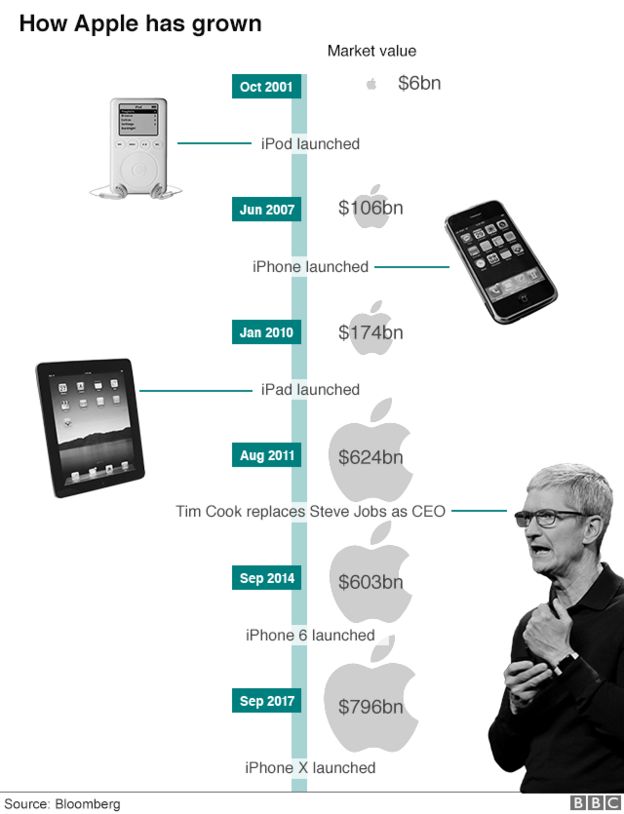Apple sold fewer iPhones than expected in its most recent quarter but higher selling prices meant the tech giant still beat Wall Street forecasts.
The firm said it sold 41.3 million iPhones in the three months to the end of June, up just 1% from last year.
But the average iPhone selling price hit $724, well above the expected $694.
The firm said its $999 iPhone X - launched last year - remained its most popular iPhone model in the quarter and had driven the higher sales price.
Strong revenue growth of 31% from Apple's services business, which includes the App store, Apple Music and Apple Pay, also boosted its performance.
The services business is on track for more than $14bn in revenue in 2020, chief executive Tim Cook said.
"We couldn't be happier with how things are going," he said.
Overall the tech giant's revenue jumped 17% year-on-year to a quarterly record of $53.3bn (£40.6bn), with every region except Japan reporting double digit growth.
Profits rose to $11.5bn, up 32% compared to the same period in 2017.
Shares in the Californian tech giant jumped more than 3% in after hours trading in New York.
The gains brought Apple, already the world's most valuable company, one step closer to a market value of $1 trillion.

The strong demand for the firm's most expensive phones marked a contrast with the world's largest smartphone seller Samsung, which disappointed investorsby warning of lower than expected sales of its high-end Galaxy S9 .
But Apple faces increasing competition in the global smart phone market, which saw growth slip 0.3% last year, according to research firm International Data Corp.
Chinese tech company Huawei, which reported 15% revenue growth in the first half of this year, overtook Apple to become the world's second-biggest smartphone seller in the quarter, according to market research firm Canalys.
That left Apple in third place after Samsung and Huawei.
Tariff impact
Executives said they are confident about Apple's position. The firm forecast revenue in the range of $60bn to $62bn in the July to September period, indicating a fifth consecutive quarter of double digit growth.
Chief executive Tim Cook also downplayed concerns about how trade tensions between the US and China might affect Apple's business.
He said the firm had not been affected directly by the tariffs in place so far. It is still reviewing the implications of threatened tariffs on a proposed $200bn in Chinese goods, he added.
"Our view on tariffs is that they show up as a tax on the consumer and wind up resulting in lower economic growth and sometimes can bring about significant risk of unintended consequences," he said.
However, he said he was optimistic that "this will get sorted out".
Latest Stories
-
4-year-old cured leper walks again after Bawumia sponsored her special surgery
3 hours -
Dorcas Affo-Toffey, earns dual Master’s Degrees in Energy, Sustainable Management, and Business Administration
4 hours -
T-bills auction: Government got GH¢21.5bn in November 2024, lower than target
7 hours -
Ghana to return to single digit inflation in quarter one 2026
7 hours -
Panama’s president calls Trump’s Chinese canal claim ‘nonsense’
8 hours -
Manmohan Singh, Indian ex-PM and architect of economic reform, dies at 92
8 hours -
Government is not been fair to WAEC – Clement Apaak on delay to release WASSCE results
8 hours -
Bayer Leverkusen’s Jeremie Frimpong donates to Osu Children’s Home in Ghana
11 hours -
GPL 2024/25: Heart of Lions beat Young Apostles to go three points clear
11 hours -
Dance battles, musical chairs light up Joy FM Party in the Park
12 hours -
Kwabena Kwabena, Camidoh, Kwan Pa Band, others rock Joy FM Family Party in the Park
12 hours -
GPL 2024/2025: Aduana beat struggling Legon Cities
12 hours -
GPL 2024/25: Bechem United fail to honor match against Holy Stars
12 hours -
Cooking competition takes centrestage at Joy FM Family Party In The Park
13 hours -
Album review: ‘Wonder’ by Nana Fredua-Agyeman Jnr
15 hours

